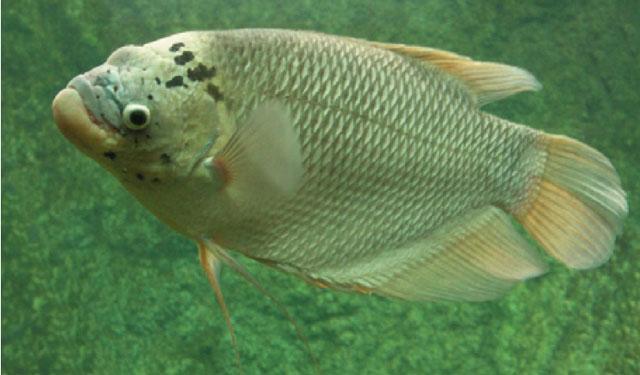| Osphronemidae (Gouramies), subfamily: Osphroneminae |
| 70 cm SL (male/unsexed) |
|
benthopelagic; freshwater; brackish; pH range: 6.5 - 8; dH range: 25; depth range - 10 m |
| Asia: probably limited to Sumatra, Borneo, Java, the Malay Peninsula, Thailand and Indochina (Mekong basin). Has been introduced to several countries for aquaculture purposes. Apparently absent in Sarawak and presence in Sabah may be due to relatively late introductions. |
|
Dorsal spines (total): 12-14; Dorsal soft rays (total): 10-13; Anal spines: 9-13; Anal soft rays: 18-21; Vertebrae: 30-31. With 8-10 complete dark vertical bars in juvenile color phase; adults without vertical bars or sexual dichromatism, both sexes drab; transverse scale rows usually 6.1.12; dorsal fin spines usually 12-13 (rarely 11 or 14); soft-rayed portion of anal fin greatly enlarged, its distal margin parallel to distal margin of caudal fin; caudal fin rounded or obtusely rounded, not truncate or emarginate (Ref. 7425). Pelvic fins with first soft ray prolonged into a thread-like tentacle reaching posteriorly to or beyond hind margin of caudal fin. |
| Inhabits swamps, lakes and rivers (Ref. 9987), among vegetation (Ref. 56749). Enters flooded forest (Ref. 9497). Found in medium to large rivers and stagnant water bodies including sluggish flowing canals (Ref. 12975). Omnivorous. Feeds on both plants and animals such as some aquatic weeds, fish, frogs, earthworms and sometimes dead animals (Ref. 6459). Can breathe moist air, so can be kept alive for long periods out of water, making it possible to distribute it in areas lacking a cold chain (Ref. 9987). Was reported from miocene deposits in Central Sumatra (Ref. 7426). Utilized fresh and eaten steamed, pan-fried and baked (Ref. 9987). |
|
Least Concern (LC); Date assessed: 21 January 2019 Ref. (130435)
|
| harmless |
|
Known from the Mekong basin around Pak Beng to the Khone Falls (Ref. 37772). Found in Ban Hang Khone at Don Khone, about 3 km below the fall line of the great waterfalls of the Mekong River at Lee Pee (Ref. 9497). Enters flooded forest (Ref. 9497). Specimens of this species previously reported from Ban Hang Khone (Ref. 9497) have been reidentified as O. exodon (Ref. 12369). This fish probably does not occur naturally in the Mekong basin (Ref. 12369). Also Ref. 4792, 4796, 31465, 56905. |
Source and more info: www.fishbase.org. For personal, classroom, and other internal use only. Not for publication.

